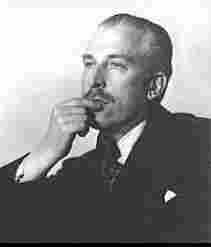SIR ARTHUR BLISS (1891-1975)
Master of the Queen's
Musick
By John France

The Man
Sir Arthur Bliss was born at Hawthornden,
Queen's Ride, Barnes on 2nd August 1891. After an education
at Rugby he went up to Pembroke College Cambridge. Further studies at
the Royal College of Music under Charles Villiers Stanford were interrupted
by the outbreak of the First World War. He had a distinguished service
in the Army. In 1921 he was appointed professor of composition at the
Royal College of Music. However this appointment lasted only a year.
He decided to devote his energies to composition.
From 1923 to 1925 he spent in California.
There he married Trudy Hoffman. Bliss was in the United States when
the Second World War broke out. He remained there to teach at the University
of Berkeley. However in 1941 he returned to England, leaving his wife
and family temporarily in the States.
From 1942 until 1944 he was Music Director
of the BBC. Bliss received a knighthood in 1950. On the death of Sir
Arnold Bax in 1953 he was appointed as Master of the Queen's Musick
- a post he held until his death and which he took seriously.
Sir Arthur Bliss died in London in 1975.
The Music
The catalogue of Sir Arthur Bliss is
comprehensive. It covers virtually every genre in the composer's tool
chest. However there are relatively few works that can be safely said
to be in the public domain. Perhaps it is the music written for the
1935 film 'Things to Come.' This was based on the book by H.G.
Wells. Many people will have heard the signature tune for the ABC Television
network in 1956. Few will realise who the composer was.
Perhaps Arthur Bliss's greatest works
were the Colour Symphony (1921) the Piano Concerto in
Bb (1938) and Morning Heroes (1930) for speaker, chorus and
orchestra.
However, there are many treasures in
the catalogue, which well deserve exploration. His chamber music is
a serious contribution to the 20th Century repertoire. But
perhaps it is the ballets that have inspired some of Bliss' finest music.
Adam Zero (1946) Checkmate (1937) and the Miracle in
the Gorbals (1944) have been successfully performed and exceptionally
well received.
Bliss can be said to have a number of
styles in his workshop. There was the early dalliance with Stravinsky
and Les Six. Then there was a return to a late romantic idiom influenced
to a certain extent by Elgar - especially perhaps in the Colour Symphony
and the music written for the royal and national occasions.
Sir Arthur Bliss for those in a Hurry
Biography
Joseph Holbrooke on Arthur Bliss
Catalogue of Works
Catalogue - Chronological
Select Discography
Bibliography & Links
The Arthur Bliss Society


 Return to:
Music on the Web
Return to:
Music on the Web